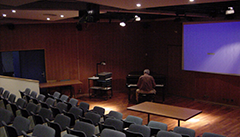
Sciences & Société
Soutenance de thèse : Moomal QURESHI
Disaggregation of electrical energy consumption in smart buildings
Doctorante : Moomal QURESHI
Laboratoire INSA : CETHIL
Ecole doctorale : ED162 : Mécanique, Energétique, Génie Civil, Acoustique de Lyon
Non-intrusive loading monitoring (NILM) is a smart solution to monitor the electrical consumption in households at the appliance level by using the aggregate data collected by a smart meter.
Non-intrusive load monitoring methods are supervised or unsupervised. The supervised algorithms require the intervention of an operator. The unsupervised methods are attractive because they do not require any intervention. Therefore, the goal of this thesis was to develop a non-intrusive load monitoring algorithm that is unsupervised and is completely data driven.
We develop an event-based disaggregation algorithm that groups similar power levels. This blind disaggregation algorithm has two steps: appliance modelling and disaggregation. In the first step, the powers are clustered by using Gaussian mixture models (GMM), without knowing in advance the number of power levels present in the data. The number of clusters is determined by Baysian information criterion (BIC). In the second step, the algorithm identifies and corrects the consumption due to the presence of distinct power levels.
We test the algorithm on two datasets, one collected by us and another one available in public access. Although they are unsupervised, most of the algorithms need expert assumptions about the number of clusters and the threshold value for event identification. The distinguishing feature of our work is that the algorithm deduces them from the data, without any external intervention. The performance of our unsupervised algorithm is comparable with other methods.
Limitations of the algorithm are due to the assumption that only two-state appliances are present in the data. The performance of the algorithm can deteriorate in the presence of other kind of appliances (continuous or multi-state power). We assume that this algorithm could be improved by using high frequency data and more collected features.
Additional informations
-
Amphithéâtre René Char (Villeurbanne)

